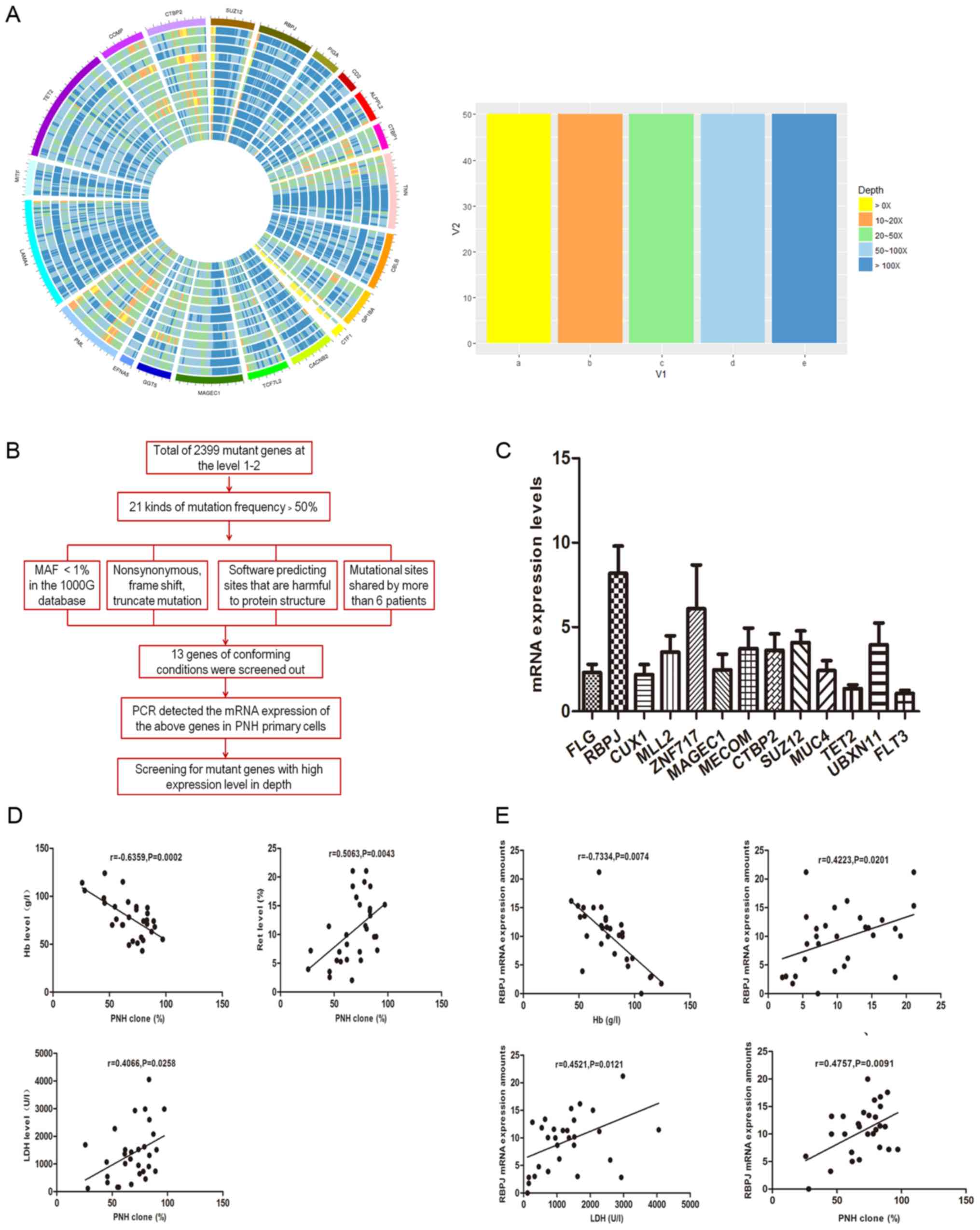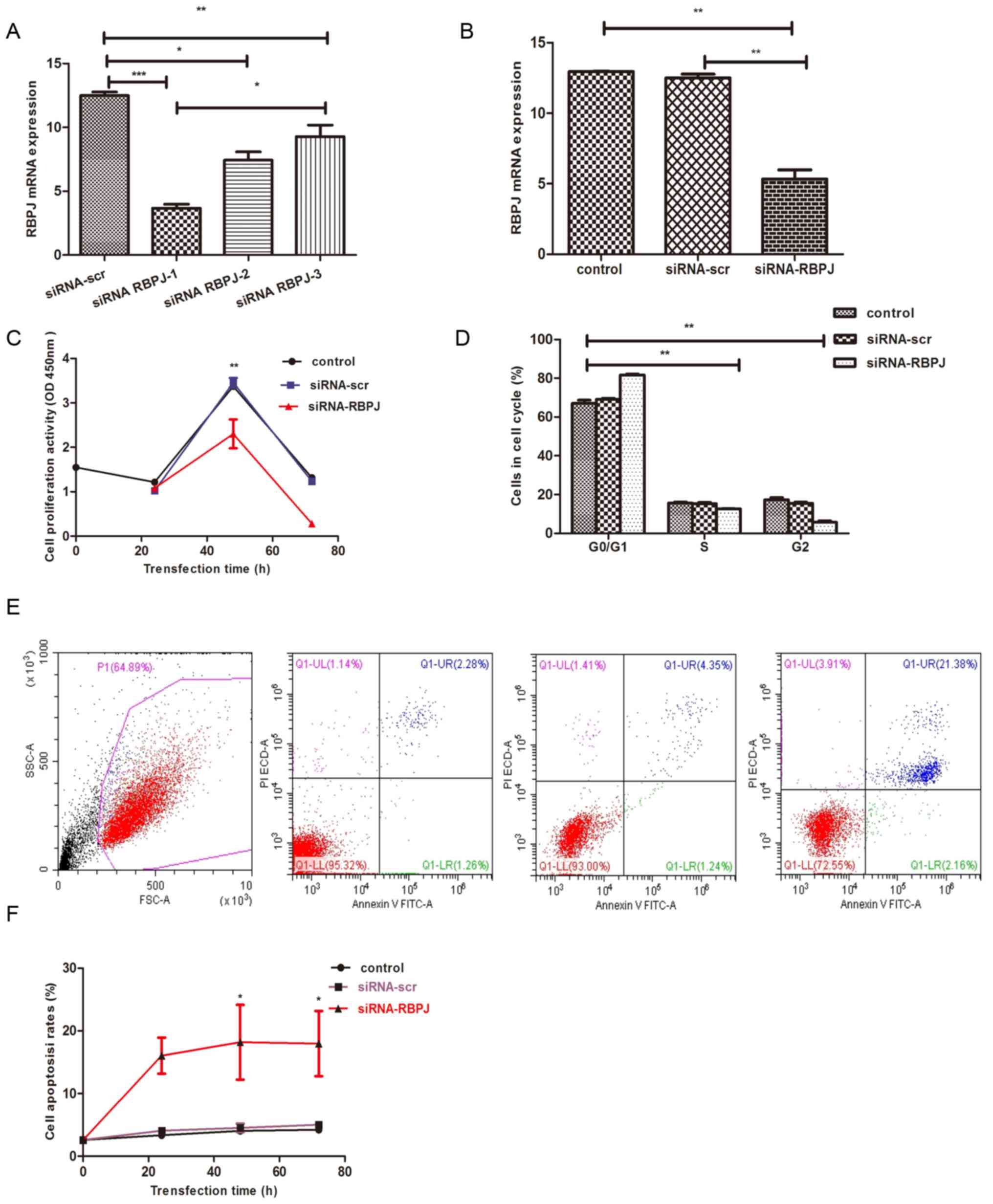|
1
|
Rotoli B and Luzzatto L: Paroxysmal
nocturnal hemoglobinuria. Semin Hematol. 26:201–207.
1989.PubMed/NCBI
|
|
2
|
Luzzatto L: Recent advances in the
pathogenesis and treatment of paroxysmal nocturnal hemoglobinuria.
F1000Res. 5:2092016. View Article : Google Scholar
|
|
3
|
Parker CJ: The pathophysiology of
paroxysmal nocturnal hemoglobinuria. Exp Hematol. 35:523–533. 2007.
View Article : Google Scholar : PubMed/NCBI
|
|
4
|
Hill A, DeZern AE, Kinoshita T and Brodsky
RA: Paroxysmal nocturnal haemoglobinuria. Nat Rev Dis Primers.
3:170282017. View Article : Google Scholar : PubMed/NCBI
|
|
5
|
Schrezenmeier H, Muus P, Socié G, Szer J,
Urbano-Ispizua A, Maciejewski JP, Brodsky RA, Bessler M, Kanakura
Y, Rosse W, et al: Baseline characteristics and disease burden in
patients in the international Paroxysmal Nocturnal Hemoglobinuria
registry. Haematologica. 99:922–929. 2014. View Article : Google Scholar : PubMed/NCBI
|
|
6
|
Socié G, Mary JY, de Gramont A, Rio B,
Leporrier M, Rose C, Heudier P, Rochant H, Cahn JY and Gluckman E:
Paroxysmal nocturnal hemoglobinuria: Long-term follow-up and
prognostic factors. Lancet. 348:573–577. 1996. View Article : Google Scholar : PubMed/NCBI
|
|
7
|
de Latour RP, Mary JY, Salanoubat C,
Terriou L, Etienne G, Mohty M, Roth S, de Guibert S, Maury S, Cahn
JY, et al: Paroxysmal nocturnal hemoglobinuria: Natural history of
disease subcategories. Blood. 112:3099–3106. 2008. View Article : Google Scholar : PubMed/NCBI
|
|
8
|
Li LY, Liu ZY, Liu H, Liu CY, Shao ZH and
Fu R: Deep Sequencing of whole genome exon inParoxysmal Nocturnal
Hemoglobinuria. Am J Hematol. 92:E51–E53. 2017. View Article : Google Scholar : PubMed/NCBI
|
|
9
|
Ramdzan ZM and Nepveu A: CUX1, a
haploinsufficient tumour suppressor gene over-expressed in advanced
cancers. Nat Rev Cancer. 14:673–682. 2014. View Article : Google Scholar : PubMed/NCBI
|
|
10
|
Kridel R, Sehn LH and Gascoyne RD:
Pathogenesis of follicular lymphoma. J Clin Invest. 122:3424–3431.
2012. View
Article : Google Scholar : PubMed/NCBI
|
|
11
|
Montagner S, Leoni C, Emming S, Della
Chiara G, Balestrieri C, Barozzi I, Piccolo V, Togher S, Ko M, Rao
A, et al: TET2 regulates mast cell differentiation and
proliferation through catalytic and non-catalytic activities. Cell
Rep. 15:1566–1579. 2016. View Article : Google Scholar : PubMed/NCBI
|
|
12
|
Sugimori C, Padron E, Caceres G, Shain K,
Sokol L, Zhang L, Tiu R, O'Keefe CL, Afable M, Clemente M, et al:
Paroxysmal nocturnal hemoglobinuria and concurrent JAK2(V617F)
mutation. Blood Cancer J. 2:e632012. View Article : Google Scholar : PubMed/NCBI
|
|
13
|
Fraiman YS, Cuka N, Batista D, Vuica-Ross
M and Moliterno AR: Development of paroxysmal nocturnal
hemoglobinuria in CALR-positive myeloproliferative neoplasm. J
Blood Med. 30:107–110. 2016.
|
|
14
|
Chen Y, Tao S, Deng Y, Song L and Yu L:
Chronic myeloid leukemia transformation in a patient with
paroxysmal nocturnal hemoglobinuria: A rare case report with
literature review. Int J Clin Exp Med. 15:8226–8229. 2015.
|
|
15
|
Tominaga R, Katagiri T, Kataoka K, Kataoka
K, Wee RK, Maeda A, Gomyo H, Mizuno I, Murayama T, Ogawa S and
Nakao S: Paroxysmal nocturnal hemoglobinuria induced by the
occurrence of BCR-ABL in a PIGA mutant hematopoietic progenitor
cell. Leukemia. 30:1208–1210. 2016. View Article : Google Scholar : PubMed/NCBI
|
|
16
|
Orent W, Mchenry AR, Rao DA, White C,
Klein HU, Bassil R, Srivastava G, Replogle JM, Raj T, Frangieh M,
et al: Rheumatoid arthritis-associated RBPJ polymorphism alters
memory CD4+ T cells. Hum Mol Genet. 25:404–417. 2016. View Article : Google Scholar : PubMed/NCBI
|
|
17
|
Nagao H, Setoguchi T, Kitamoto S, Ishidou
Y, Nagano S, Yokouchi M, Abematsu M, Kawabata N, Maeda S, Yonezawa
S and Komiya S: RBPJ is a novel target for rhabdomyosar coma
therapy. PLoS One. 7:e392682012. View Article : Google Scholar : PubMed/NCBI
|
|
18
|
Parker C, Omine M, Richards S, Nishimura
J, Bessler M, Ware R, Hillmen P, Luzzatto L, Young N, Kinoshita T,
et al: Diagnosis and management of paroxysmal nocturnal
hemoglobinuria. Blood. 106:3699–3709. 2006. View Article : Google Scholar
|
|
19
|
Livak KJ and Schmittgen TD: Analysis of
relative gene expression data using real-time quantitative PCR and
the 2(-Delta Delta C(T)) method. Methods. 25:402–408. 2001.
View Article : Google Scholar : PubMed/NCBI
|
|
20
|
Kalejta RF, Shenk T and Beavis AJ: Use of
a membrane-localized green fluorescent protein allows simultaneous
identification of transfected cells and cell cycle analysis by flow
cytometry. Cytometry. 29:286–291. 1997. View Article : Google Scholar : PubMed/NCBI
|
|
21
|
Shen W, Clemente MJ, Hosono N, Yoshida K,
Przychodzen B, Yoshizato T, Shiraishi Y, Miyano S, Ogawa S,
Maciejewski JP and Makishima H: Deep sequencing reveals stepwise
mutation acquisition in paroxysmal nocturnal hemoglobinuria. J Clin
Invest. 124:4529–4538. 2014. View
Article : Google Scholar : PubMed/NCBI
|
|
22
|
Richards S, Aziz N, Bale S, Bick D, Das S,
Gastier-Foster J, Grody WW, Hegde M, Lyon E, Spector E, et al:
Standards and guidelines for the interpretation of sequence
variants: A joint consensus recommendation of the American College
of Medical Genetics and Genomics and the Association for Molecular
Pathology. Genet Med. 17:405–424. 2015. View Article : Google Scholar : PubMed/NCBI
|
|
23
|
Karadimitris A and Luzzatto L: The
cellular pathogenesis of paroxysmal noctural hemogolbinuria.
Leukemia. 15:1148–1152. 2001. View Article : Google Scholar : PubMed/NCBI
|
|
24
|
Dacie JV: Paroxysmal nocturnal
haemoglobinuria. Proc R Soc Med. 56:587–596. 1963.PubMed/NCBI
|
|
25
|
Brodsky RA, Vala MS, Barber JP, Medof ME
and Jones RJ: Resistance to apoposis caused by PIG-A mutations in
paroxysmal noctural hemogolbinuria. Proc Natl Acad Sci USA.
94:8756–8760. 1997. View Article : Google Scholar : PubMed/NCBI
|
|
26
|
Horikawa K, Nakakuma H, Kawaguchi T,
Iwamoto N, Nagakura S, Kagimoto T and Takatsuki K: Apoptosis
resistance of blood cells from patients with paroxysmal nocturnal
hemoglobinuria, aplastic anemia, and myelodysplastic syndrome.
Blood. 90:2716–2722. 1997.PubMed/NCBI
|
|
27
|
Hansen NE and Killmann SA: Paroxysmal
nocturnal hemoglobinuria in myelofibrosis. Blood. 36:428–431.
1970.PubMed/NCBI
|
|
28
|
Luzzatto L, Familusi JB, Williams CK,
Junaid TA, Rotoli B and Alfinito F: The PNH abnormality in
myeloproliferative disorders: Association of PNH and acute
erythremic myelosis in two children. Haematologica. 64:13–30.
1979.PubMed/NCBI
|
|
29
|
Nishimura JI, Inoue N, Azenishi Y, Hirota
T, Akaogi T, Shibano M, Kawagoe K, Ueda E, Machii T and Takeda J:
Analysis of PIG-A gene in a patient who developed reciprocal
translocation of chromosome 12 and paroxysmal nocturnal
hemoglobinuria during follow-up of aplastic anemia. Am J Hematol.
51:229–233. 1996. View Article : Google Scholar : PubMed/NCBI
|
|
30
|
Inoue N, Izui-Sarumaru T, Murakami Y, Endo
Y, Nishimura J, Kurokawa K, Kuwayama M, Shime H, Machii T, Kanakura
Y, et al: Molecular basis of clonal expansion of hematopoiesis in 2
patients with Paroxysmal nocturnal hemoglobinuria. Blood.
108:4232–4236. 2006. View Article : Google Scholar : PubMed/NCBI
|
|
31
|
Brodsky RA: Paroxysmal nocturnal
hemoglobinuria: Stem cells and clonality. Hematology Am Soc Hematol
Educ Program. 111–115. 2008. View Article : Google Scholar : PubMed/NCBI
|
|
32
|
Katagiri T, Tominaga R, Kataoka K, Maeda
A, Gomyo H, Mizuno I, Murayama T, Ogawa S and Nakao S: A cure for
paroxysmal nocturnal hemoglobinuria using molecular targeted
therapy specific to a driver mutation. Blood. 126:12152015.
|
|
33
|
Cancer Genome Atlas Research Network, ;
Ley TJ, Miller C, Ding L, Raphael BJ, Mungall AJ, Robertson A,
Hoadley K, Triche TJ Jr, Laird PW, et al: Genomic and epigenomic
landscapes of adult de novo acute myeloid leukemia. N Engl J Med.
368:2059–2074. 2013. View Article : Google Scholar : PubMed/NCBI
|
|
34
|
Leproust E: Target-enrichment strategies
for next generation sequencing. MLO Med Lab Obs. 44:26–27.
2012.PubMed/NCBI
|
|
35
|
Ng SB, Buckingham KJ, Lee C, Bigham AW,
Tabor HK, Dent KM, Huff CD, Shannon PT, Jabs EW, Nickerson DA, et
al: Exome sequencing identifies the cause of a mendelian disorder.
Nat Genet. 42:30–35. 2010. View
Article : Google Scholar : PubMed/NCBI
|
|
36
|
Warr A, Robert C, Hume D, Archibald A,
Deeb N and Watson M: Exome sequencing: Current and future
perspectives. G3 (Bethesda). 5:1543–1550. 2015. View Article : Google Scholar : PubMed/NCBI
|
|
37
|
Liu C, Shi X, Wang L, Wu Y, Jin F, Bai C
and Song Y: SUZ12 is involved in progression of non-small cell lung
cancer by promoting cell proliferation and metastasis. Tumour Biol.
35:6073–6082. 2014. View Article : Google Scholar : PubMed/NCBI
|
|
38
|
Kulic I, Robertson G, Chang L, Baker JH,
Lockwood WW, Mok W, Fuller M, Fournier M, Wong N, Chou V, et al:
Loss of the Notch effector RBPJ promotes tumorigenesis. J Exp Med.
212:37–52. 2015. View Article : Google Scholar : PubMed/NCBI
|
|
39
|
Wong CC, Martincorena I, Rust AG, Rashid
M, Alifrangis C, Alexandrov LB, Tiffen JC, Kober C; Chronic Myeloid
Disorders Working Group of the International Cancer Genome
Consortium, ; Green AR, et al: Inactivating CUX1 mutations promote
tumorigenesis. Nat Genet. 46:33–38. 2014. View Article : Google Scholar : PubMed/NCBI
|
|
40
|
Wienand K and Shires K: The use of MAGE C1
and flow cytometry to determine the malignant cell type in multiple
myeloma. PLoS One. 10:e01207342015. View Article : Google Scholar : PubMed/NCBI
|
|
41
|
Mugnaini E and Floris A: The unipolar
brush cell: A neglected neuron of the mammalian cerebellar cortex.
J Comp Neurol. 339:174–180. 1994. View Article : Google Scholar : PubMed/NCBI
|
|
42
|
Nunzi MG, Birnstiel S, Bhattacharyya BJ,
Slater NT and Mugnaini E: Unipolar brush cells from a glutamatergic
projection system within the mouse cerebellar cortex. J Comp
Neurol. 434:329–341. 2001. View Article : Google Scholar : PubMed/NCBI
|
|
43
|
Sotelo C and Changeux JP: Bergmann fibers
and granular cell migration in the cerebellum of homozygous weaver
mutant mouse. Brain Res. 77:484–491. 1974. View Article : Google Scholar : PubMed/NCBI
|
|
44
|
Gerhardt DM, Pajcini KV, D'altri T, Tu L,
Jain R, Xu L, Chen MJ, Rentschler S, Shestova O, Wertheim GB, et
al: The Notch1 transcriptional activation domain is required for
development and reveals a novel role for Notch1 signaling in fetal
hematopoietic stem cells. Gene Dev. 28:576–593. 2014. View Article : Google Scholar : PubMed/NCBI
|
|
45
|
Maillard I, Weng AP, Carpenter AC,
Rodriguez CG, Sai H, Xu L, Allman D, Aster JC and Pear WS:
Mastermind critically regulates Notch-mediated lymphoid cell fate
decisions. Blood. 104:1696–1702. 2004. View Article : Google Scholar : PubMed/NCBI
|
|
46
|
Lv Q, Shen R and Wang J: RBPJ inhibition
impairs the growth of lung cancer. Tumour Biol. 36:3751–3756. 2015.
View Article : Google Scholar : PubMed/NCBI
|
|
47
|
Xue L, Li H, Chen Q, Wang Z, Zhang P, Chen
H, Wang Z and Chong T: Inhibition of recombining binding protein
suppressor of hairless (RBPJ) Impairs the growth of prostate
cancer. Cell Physiol Biochem. 36:1982–1990. 2015. View Article : Google Scholar : PubMed/NCBI
|
















